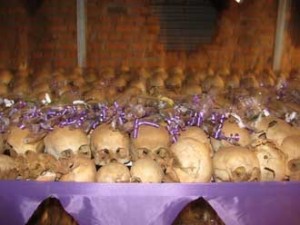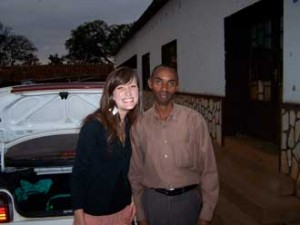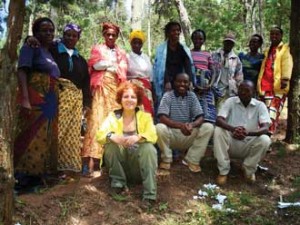
As the following Notes From the Field articles demonstrate, not all classrooms are created equal. Some of the most valuable lessons cannot be contained in four walls, cannot be brought to life by words on a page and cannot be hammered home by a mid-term exam. Sometimes you have to live the lesson, breathe the lesson, touch the lesson.
In some ways, the two stories are similar; both are written by McGill undergrads and winners of an $8,000 Association of Universities and Colleges of Canada award, and both are about internships in Africa with Rwanda as the focus.
Over the course of their respective seven-week internships, Jeannine Plamondon (who worked at the International Criminal Tribunal for Rwanda) and Sarah Woolf (who collaborated with the Rwandan Widow’s Association in a sustainable bee-keeping enterprise) had a crash course in harsh reality. Theirs was most definitely not a PowerPoint introduction to genocide. They met, talked to, worked with and, most importantly, learned from survivors of unspeakable atrocities.
It is particularly interesting to read both accounts together because the two women have come away with very different views of Rwanda. Listening to daily accounts of the horrors perpetrated in 1994, Plamondon was haunted by the spectre of genocide throughout her experience. But Woolf, who worked with women trying to raise themselves from the ashes of decimated lives, tells a tale of rebirth, albeit at times a cautious one.
Although their Rwandan education taught them different things, one thing is abundantly clear: Both Plamondon and Woolf have learned their lessons well.

Trying to know the unknowable
By Jeannine Plamondon
I have read a lot about the Rwanda genocide. I know who planned it and how it was acted out. I know how long it lasted and I know how many were killed. And now that I have been working in Tanzania at the International Criminal Tribunal for Rwanda (ICTR) as an intern through the McGill Centre for Human Rights and Legal Pluralism, I know who orchestrated which roadblock, what he said when he was there, and how long it took to travel from one massacre site to another. But the more I know, the less I understand. How do you understand a concept like genocide? The total annihilation of a people. It’s like understanding infinity or the universe, only far more sinister.
But I am here to learn and to understand, and hopefully in some small way, to help, so I take every opportunity to do just that. First, there is a judgement for one of the genocide cases: Callixte Kalimanzira [Editor’s Note: Kalimanzira was the Interior Minister of the interim government of Rwanda during the 1994 genocide. On June 22, Kalimanzira, was sentenced to 30 years in prison for two counts of genocide and direct and public incitement to commit genocide.] This will help me to see justice at the ICTR first-hand. It is all very technical, and to be honest I am a bit bored, until I realize that Kalimanzira, the man on trial for the worst crimes conceivable, is the man sitting right in front of me; the man who looks scared, and a bit sick, and sad. By the end of the judgement, I am the one who is sick and sad. But he’s guilty, my co-worker tells me. He committed genocide. Yeah, I know… but that doesn’t make me feel better. It makes me feel worse.
Now I see how justice plays out, but am left with yet another question… why do I feel bad for a man who
committed genocide?
Later we are meeting for dinner at the Ethiopian restaurant. It’s a big group and everyone is having a good time. Our food hasn’t come yet, so I get up to go to the bathroom. My friend comes with me and we are talking. We hear firecrackers outside, pause, keep talking. Our waitress runs to the back of the restaurant where we are. “Bad men! With guns! Hide!” The firecrackers are AK-47s. We are confused. Is this a joke? A bad translation? We are hiding on the balcony… our friends are downstairs with the bad men. Are they OK? Are the bad men coming for us?
Afterwards no one is hurt. The parrot was killed, he was making too much noise. Some are hysterical, some are crying. It is probably the worst 20 minutes any of us have ever experienced. Now maybe I see somewhat how the terrorized Rwandans felt.
But how do you compare 20 minutes of fear and a dead parrot to 100 days of terror and one million dead?
We are going to Rwanda; maybe now, at the place where it happened, we will understand how it happened, why it happened. We visit genocide memorial after genocide memorial. These are the skulls of the victims. These are their bones. These are their clothes. Their personal items: combs, glasses, pencils. Their names. Many names are missing… there was no one left to identify them. For every memorial we visit, we pass at least five more. They are everywhere. It was everywhere. Genocide. Our taxi driver Célestin has become my friend. I translate for the other interns. “How did you survive?” The questions I could never ask if I wasn’t just interpreting the words of someone else. “I hid in an outhouse for four months. The smell kept the Interahamwe [a Hutu paramilitary organization] away.” I hid on a balcony over a bathroom for 20 minutes. And in one month I will be back in a place where things like that don’t happen. How do I respond? How can I understand? “My sister, she was here in this church. The Interahamwe, they tied her wrists and ankles. They sharpened a machete in front of her. And then they….” he finishes with his hands. How do I translate that? How do I tell my friends that my new friend’s sister was raped by a machete? And what do I say to my friend? Instead he speaks to me: “Don’t cry please. I don’t mean to upset you.”
We are leaving the memorial and heading back to Kigali. Tomorrow we will sit on a beach at Lake Kivu. I need a couple of days to not think about genocide, I feel depressed and hopeless and tired, and my brain hurts from trying to understand. The bus driver is playing Bob Marley and all of a sudden the guys in front of us are singing along. Now we are singing along too, and others join in. How can a people who lived through genocide sit on a bus together and sing “One Love”? There are some things I don’t need to understand.
Jeannine Plamondon is a third-year Law undergraduate who was a legal intern in the Office of the Prosecutor of the ICTR.

Moving beyond the horror
By Sarah Woolf
“You’re either an Africa person, or an Asia person.” My friend Elizabeth posits her theory as we sit poolside at Hotel Credo. Lindsey, my housemate, immediately responds with a forceful: “I’m so an Asia person.” We all laugh, because this scene is unfolding in Rwanda, the heart of Africa.
As for me, I can’t claim to be fulfilling a long-held childhood dream to come to Rwanda. I applied to End Poverty Now’s internship here on a lark; my other summer plans fell through. I was looking for anything to keep me busy for four months, so when I saw the combination of words ‘beekeeping,’ ‘widows,’ and ‘Rwanda,’ I jumped at the chance.
There was only one problem. I actually didn’t know much about this country.
I knew, intellectually at least, that Africa is not a homogenous, massive plot of land full of nation-less ‘Africans.’ I knew there were national, tribal, geographical, cultural, racial (and so on) differences. This ‘knowledge’ didn’t prevent me from conjuring up an embarrassingly limited and ignorantly stereotypical array of images: deserts, lions, giraffes, wide plains, tents, the blazing sun, drums, huts. Only upon my arrival would I find that, no, Rwanda isn’t teeming with deserts and lions. About the last thing you would call it is ‘flat,’ and though the sun is shining now, it rained non-stop in my first month here. Maybe these pre-departure visions are not poor estimations of another African country, but as far as Rwanda goes, they were just wrong. The other images I’d had, those of Rwanda specifically, weren’t so innocuous: HIV/AIDS, machetes, disease, war, death, hunger, thirst. Above all, like most Westerners, when I thought of Rwanda, I thought of genocide.
I imagined a fragile peace tentatively balanced in a place writhing with hostile energy. I imagined hatred, guilt, resentment, distrust, sorrow. The images I conjured up in my mind were only negative. Now, I am happy to report that I was just as wrong in my estimation of Rwanda as I was in my mental depiction of Africa.
As I’ve been saying, I’m no expert on Rwanda. Furthermore, I cannot claim any expertise in the matter of genocide – not its causes, its conflicts, or its repercussions. What I offer here, which could easily and perhaps justifiably be perceived as ‘naive,’ is only my honest view of Rwanda. Much of this insight, if you can call it that, comes from my work in the villages outside Butare. The women I work with are widows; indeed, some are widows of men killed in the genocide. But others are ‘widows’ of men imprisoned for crimes committed during the genocide.
Still others are widows of HIV/AIDS. Many of the women are living with HIV/AIDS themselves, and/or raising children who have contracted this devastating disease. In this community of women, Hutu and Tutsi and Twa, it does not feel as though the genocide – and its legacy – is the force now threatening the tentative peace in our community; rather, a new enemy threatens the lives of Rwandans.
I do not mean to minimize the impact of the genocide, planned and executed only 15 years ago this past April. Physical, and psychological scars still run deeply beneath the calm, orderly surface of Rwandan culture. The travesty and impact of the genocide will not soon be forgotten, will not cease to hurt its survivors. But it seems to me that, now, Rwandans are rallying around each other in order to ward off a common enemy, a disease that does not discriminate based on tribe. The word on everyone’s lips is now ‘AIDS.’
Recently, I wrote to family and friends about our housekeeper in Butare. I noted his tendency to lie face down on the grass in our yard for hours at a time. I thought this was a curious and cute habit, and I wanted to ask him what he was thinking about during these times. One family friend responded to me, “Sarah, think about where you are.”
I hadn’t considred that Nyamwasa could be thinking about the genocide. I clamped up with shame. Perhaps he was thinking about family and friends lost, dreams quashed, opportunities long gone…
But then I remembered his smile. Whenever he’s lying in the grass, soaking up the sunshine, he normally has a massive smile plastered to his face. Or he’s sending a text message to some friends. Or he’s lying beside his old copy of FHM.
Not everything here is about genocide.
You can spend hours musing over what your friends were doing in 1994, or who lived in your house, or why that building is still in ruins. You can wonder if someone is Hutu or Tutsi, if their parents are still alive, what province they are from. You can lose sleep, as one housemate has done, wondering if anyone died in our house. You can let the genocide pervade your thoughts in and about Rwanda.
But for me, at least, this would be forced, unnatural and not in line with what everyone else in this country is doing. My friends in Rwanda are studying for exams. They’re not worrying about the fact that they are two years older than their Western colleagues because their education was put on hold. My friends are going on vacation. They aren’t meditating on how many people were or were not killed everywhere they go. My friends are working for themselves and their communities. They aren’t human fortresses, absolved of any desire to make their world a better place.
My friends are laughing, singing, joking, dancing, studying, eating, playing, cursing, drinking, swimming, betting, and hoping. They are enigmas, frustrating and inspiring me at the same time.
My portrayal of Rwanda is more idyllic than any country can ever be. But I hope to uproot from your minds the notion that this beautiful country is synonymous with the ugly notion of genocide.
I think Rwandans are friendly, but reserved. I think their garments are painted with duller colours than the clothing worn by their neighbours. I think they grasp painfully tight to the notion of ‘progress.’ I think they aim to be different from Africa, and yet so clearly desire to be a part of it. The genocide’s legacy can be found everywhere – even in these statements.
But there is a time and a place to look for it. When I remember Rwanda years from now, I can tell you, the first thing I remember will not be genocide. It will be the hills. The endless beauty of the ‘Land of a Thousand Hills.’ I hope, when you think of Rwanda, you won’t think of ‘Hotel Rwanda.’ If you must think of that particular story as representative of this country, think of it instead as ‘Hotel des Milles Collines,’ its real – if less dramatic and Oscar-friendly – name.
I don’t know if I am an ‘Africa person’ or an ‘Asia person,’ if such a thing exists. But I am beginning to think, maybe I’m a ‘Rwanda person.’
Sarah Woolf is doing a double major in Political Science and Women’s Studies with a minor in Jewish Studies.
